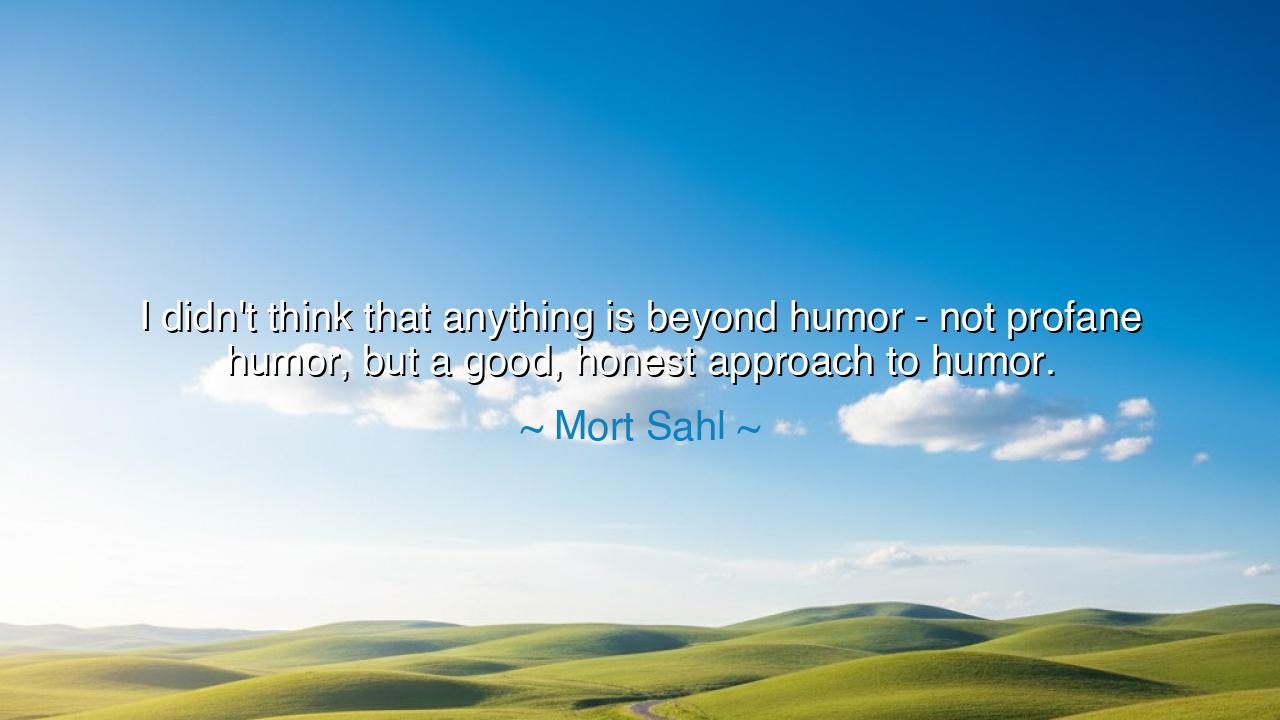
I didn't think that anything is beyond humor - not profane humor
I didn't think that anything is beyond humor - not profane humor, but a good, honest approach to humor.






The words of Mort Sahl, “I didn’t think that anything is beyond humor — not profane humor, but a good, honest approach to humor,” are a declaration of artistic courage — the kind of courage that belongs not only to comedians, but to all who dare to speak truth through laughter. In this statement lies a philosophy as ancient as the jesters who mocked kings and as timeless as the poets who hid wisdom in jest. For humor, in its purest form, is not triviality — it is revelation. It is the mirror that shows the soul of humanity as it is, stripped of pretense, hypocrisy, and fear.
Sahl’s words were born from a time when comedy itself was awakening — the postwar years of America, when laughter became a tool not only of escape but of confrontation. Mort Sahl, standing before audiences with nothing but a rolled-up newspaper and his fierce wit, revolutionized stand-up comedy by turning it into commentary — a moral instrument sharpened by irony. Where others sought applause, he sought awareness. When he said that nothing was “beyond humor,” he meant that no subject — war, politics, hypocrisy, or even tragedy — should be sealed away from laughter’s light, so long as that laughter came from honesty and not from cruelty.
The ancients, too, knew that humor was sacred ground. The philosopher Socrates was known to laugh even in argument, for he saw in irony the weapon of truth. The dramatists of Athens — Aristophanes above all — wielded satire like a torch, casting it upon corruption and folly. When the people of Athens grew proud, Aristophanes mocked them; when they grew fearful, he comforted them with laughter. He too would have agreed with Sahl: that there is nothing beyond humor, for humor is not a denial of seriousness but a pathway to understanding it. In laughter, the soul breathes; it finds release from the weight of its illusions.
What Sahl rejects, however, is profane humor — that which wounds without insight, mocks without purpose, desecrates rather than enlightens. True humor, he reminds us, must come from truth and compassion. The great satirists have always known this. Mark Twain, who laughed at the pretensions of his nation, never sneered from hatred — his wit was born of love for the flawed creature called man. Likewise, Charlie Chaplin, whose silent comedy turned poverty and pain into poetry, proved that humor can lift even the most tragic moment into something luminous. This is the “honest approach to humor” that Sahl speaks of — laughter not as mockery, but as medicine.
History is filled with those who dared to laugh in dark times. During the rule of tyrants, jesters in royal courts were often the only ones who could speak truth without losing their heads. They hid wisdom behind laughter, turning ridicule into resistance. In this tradition stands Mort Sahl — the modern jester, fearless and sincere. His stage was not a court but a nation, his humor not cheap but cutting. He understood that to make people laugh about the unthinkable is to give them power over it. For as long as something can be laughed at, it cannot entirely conquer the human spirit.
Yet, this freedom comes with responsibility. To approach humor honestly is to wield a double-edged sword with wisdom. The ancient teachers of rhetoric warned that every word carries a moral weight. So too does every jest. When humor springs from arrogance, it destroys; when it springs from empathy, it heals. The wise comedian, like the wise philosopher, must therefore know not only what to say, but why. True humor is an act of humility — the recognition that all of us are absurd, all of us broken, all of us worthy of being both forgiven and laughed at.
Let this, then, be the teaching: nothing in life is beyond humor, for nothing in life is beyond redemption. To laugh at the world is to refuse despair; to laugh at ourselves is to remember that we are human. Approach humor as Mort Sahl did — with honesty, with courage, and with respect for truth. Use laughter not to divide but to awaken, not to humiliate but to illuminate. In every age, darkness will threaten to silence the voice of joy — yet humor, when rooted in truth, will always endure as the light that no tyranny, no fear, and no sorrow can extinguish.
For as Mort Sahl reminds us, laughter is not the enemy of seriousness — it is its companion. The world may tremble, the powerful may rise and fall, but as long as there is one honest voice willing to laugh, there will be hope. And that hope — born of courage, wit, and wisdom — is the truest expression of the human spirit.






AAdministratorAdministrator
Welcome, honored guests. Please leave a comment, we will respond soon